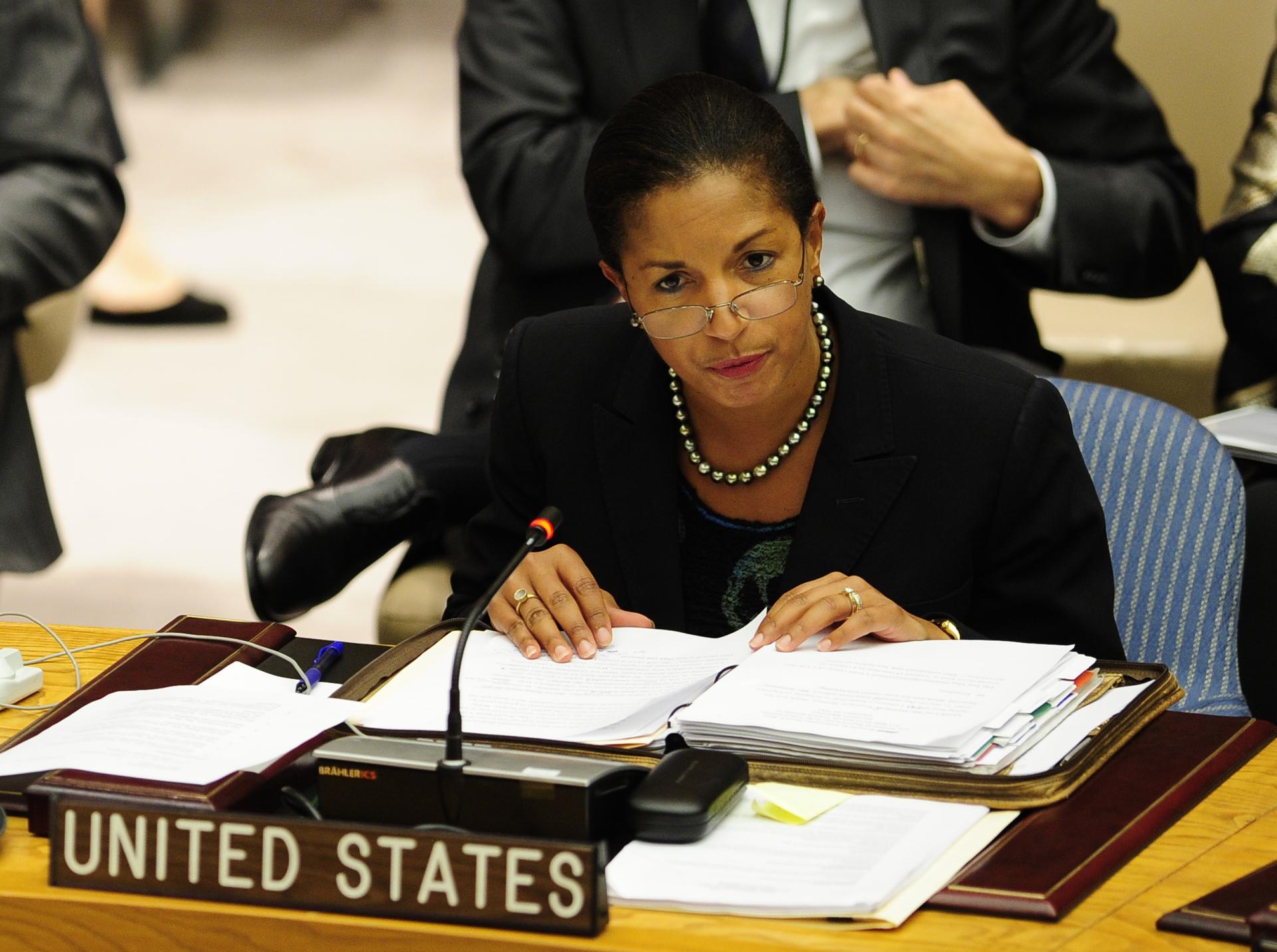Former Ambassador says WSJ article unfairly attacked Susan Rice
US Ambassador to the UN Susan Rice speaks during a Security Council meeting in September.
Susan Rice withdrew her name from consideration to be Secretary of State with character and grace, placing national interest above personal ambition. This came in stark contrast to weeks of unsightly and scathing political attacks that preceded her decision to bow out. These attacks spun tale after tale of her responsibility for alleged foreign policy blunders, from genocide in Rwanda to an alleged cover-up of the facts surrounding the tragic deaths in Benghazi.
Perhaps the most egregious attack was a December 11 Wall Street Journal column claiming Ambassador Rice collaborated with the Revolutionary United Front (RUF) of Sierra Leone, a rebel group whose macabre trademark was amputating the limbs of defenseless civilians, including women and children. This portrayal of Susan Rice was an absurd lie that overlooked her efforts to resolve the Sierra Leonean conflict and protect civilian lives.
For the record, Susan Rice never met or engaged with the RUF or collaborated any of its leaders. Instead, she worked to bolster Economic Community of West African States (ECOWAS) Monitoring Group forces in Sierra Leone to defeat the RUF militarily. Some members of the US Congress, however, had issues with Nigeria and refused to provide even modest funding to keep Nigerian forces in place. This resulted in a Nigerian threat to withdraw.
Nigeria became disgruntled because it was funding the total cost of the peacekeeping operation while sustaining significant troop losses from vicious attacks by the RUF. Nigeria’s withdrawal from Sierra Leone would have opened the country to takeover by the RUF and a tragic escalation of atrocities. This was the scenario that the government of Sierra Leone and the ECOWAS were confronting when a regional decision was made to engage the RUF in negotiations.
The resulting Lome Accord was not a product of American diplomacy. President Ahmad Kabbah’s officials negotiated the agreement with representatives of the RUF. The negotiations took place under the aegis of ECOWAS and the Chairman of ECOWAS, the late president of Togo, played a critical role. Diplomats from Nigeria and Ghana also were deeply involved, and the African Union sent officials to Lome. The US had two representatives present as observers: US Ambassador to Sierra Leone, Joseph Melrose, and an official from USAID’s Office of Transitional Initiatives (OTI). Neither participated in the formal negotiations or sensitive meetings. There was never any US pressure on Kabbah to sign the agreement.
The Lome Accord presented the US with a fait accompli. If RUF fighters had not been granted amnesty, there would have been no agreement. They possibly could have overrun Freetown and other key areas in Sierra Leone, with disastrous consequences for the civilian population and the future of the nation.
The government of Sierra Leone had no armed forces and Nigeria was no longer willing or able to provide the shield the Kabbah government needed to survive. Foday Sankoh’s appointment as vice president was a concession made by Kabbah and supported by ECOWAS. It was debatable, however, whether the appointment had other than symbolic meaning since the powers of the vice president were defined and delegated by the president. As Susan Rice correctly stated in her Senate testimony, the US was willing to work with the newly establish Commission on Resources, even though the Commission was headed by Foday Sankoh, the leader and founder of RUF.
The US plan, however, was to construct and configure the commission in such a way that Foday Sankoh would have been a figurehead with no real power or decision-making authority. The author of the Journal article was unaware of this plan because, it appears, he never spoke to any American official who observed or any other party directly involved in the Lome peace process. Moreover, it is doubtful that he ever read the Lome Accord or looked carefully into how the Accord came about.
Like other politically motivated attacks against her, the Journal article was laced with insinuations and inaccuracies; it was part of an orchestrated campaign to smear her reputation. Ambassador Rice will continue to serve in the President’s cabinet and represent the United States at the United Nations. Her reputation deserves a defense from unfair and unfounded attacks. Once the historical record has been set straight, it will become clear that Ambassador Rice not only positively contributed to ending the war in Sierra Leone but also played a key role in bringing peace to neighboring Liberia and encouraging constitutional democracy in Nigeria.
Howard F. Jeter is former US Ambassador to Nigeria and Senior Fellow of the Enough Project, an organization that works to end genocide and crimes against humanity, focused on areas where some of the world’s worst atrocities occur.
Every day, reporters and producers at The World are hard at work bringing you human-centered news from across the globe. But we can’t do it without you. We need your support to ensure we can continue this work for another year.
Make a gift today, and you’ll help us unlock a matching gift of $67,000!
